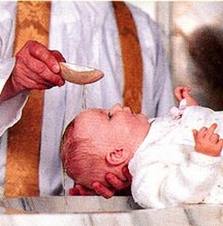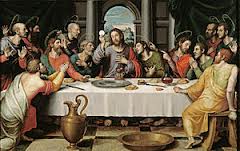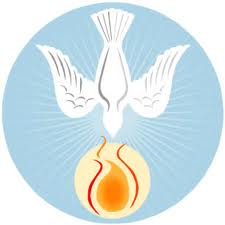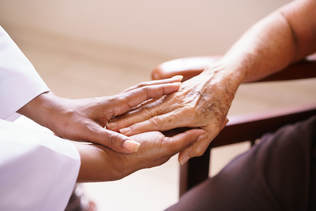The Sacraments
Baptism

This is full initiation by water and the Holy Spirit into Christ's Body, the church. God establishes an indissoluble bond with each person in baptism. God adopts us, making us members of the church and inheritors of the Kingdom of God (BCP, pp. 298, 858). In baptism we are made sharers in the new life of the Holy Spirit and the forgiveness of sins. Baptism is the foundation for all future church participation and ministry. Each candidate for baptism in the Episcopal Church is to be sponsored by one or more baptized persons. Sponsors (godparents) speak on behalf of candidates for baptism who are infants or younger children and cannot speak for themselves at the Presentation and Examination of the Candidates. During the baptismal rite the members of the congregation promise to do all they can to support the candidates for baptism in their life in Christ. They join with the candidates by renewing the baptismal covenant. The water of baptism may be administered by immersion or affusin (pouring) (BCP, p. 307). Candidates are baptized "in the Name of the Father, and of the Son, and of the Holy Spirit," and then marked on the forehead with the sign of the cross. Chrism may be used for this marking. The newly baptized is "sealed by the Holy Spirit in Baptism and marked as Christ's own for ever." When all baptisms have been completed, the celebrant and congregation welcome the newly administered within the eucharist as the chief service on a Sunday or another feast. The Catechism notes that "Infants are baptized so that they can share citizenship in the Covenant, membership in Christ, and redeption by God." The baptismal promises are made for infants by their parents or sponsors, "who guarantee that the infants will be brought up within the Church, to know Christ and be able to follow him" (BCP, pp. 858-859). Baptism is especially appropriate at the Easter Vigil, the Day of Pentecost, All Saint's Day or the Sunday following, and the Feast of the Baptism of our Lord (the First Sunday after the Epiphany).
The Eucharist

The sacrament of Christ's body and blood, and the principal act of Christian worship. The term is from the Greek, "thanksgiving." Jesus instituted the eucharist "on the night when he was betrayed." At the Last Supper he shared the bread and cup of wine at a sacred meal with his disciples. He identified the bread with his body and the wine with his blood of the new covenant. Jesus commanded his disciples to "do this" in remembrance of him (see 1 Cor 11:23-26; Mk 14:22-25; Mt 26:26-29; Lk 22:14-20). Christ's sacrifice is made present by the eucharist, and in it we are united to his one self-offering (BCP, p. 859). The Last Supper provides the basis for the fourfold eucharistic action of taking, blessing, breaking, and sharing. Christ's body and blood are really present in the sacrament of the eucharist and received by faith. Christ's presence is also known in the gathered eucharistic community.
Confirmation

The adult affirmation of our baptismal vows. The sacramental rite in which the candidates "express a mature commitment to Christ, and receive strength from the Holy Spirit through prayer and the laying on of hands by a bishop" (BCP, p. 860). Those who were baptized at an early age and those baptized as adults without laying on of hands by a bishop are expected to make a mature public affirmation of their faith, recommit themselves to the responsibilities of their baptism, and receive laying on of hands by a bishop (BCP, p. 412). Adults baptized with the laying on of hands by a bishop are considered to be confirmed. The Episcopal Church's theology of Confirmation has continued to evolve along with its understanding of baptism. Confirmation is no longer seen as the completion of Christian initiation, nor is Confirmation a prerequisite for receiving communion. Baptism is full initiation by water and the Holy Spirit into Christ's body the church (BCP, p. 298). Accordingly, Confirmation has been increasingly understood in terms of a mature, public reaffirmation of the Christian faith and the baptismal promises. Some dioceses require that candidates for Confirmation be at least sixteen years old to insure that the candidates are making a mature and independent affirmation of their faith.
Matrimony

The sacramental rite of the church in which a couple "enter into a life-long union, make their vows before God and the Church, and receive the grace and blessing of God to help them fulfill their vows" (BCP, p. 861). The union is understood to be intended by God for their mutual joy; for the help and comfort given one another in prosperity and adversity; and, when it is God's will, for the procreation of children and their nurture in the knowledge and love of the Lord (BCP, p. 423). At the Declaration of Consent, both promise to love, comfort, honor, and keep their spouse, in sickness and in health, and, forsaking all others, to be faithful to their spouse as long as they both live (BCP, p. 424). The congregation witnesses the couple's promises, and the members of the congregation promise to do all in their power to uphold the couple in their marriage. At the Marriage, the couple may pledge their lives to each other by the giving and receiving of rings as symbols of their vows. When desired, other appropriate symbols of their vows may be used instead of rings. In the Episcopal Church it is required that at least one of the parties be a baptized Christian, that the ceremony be attested by at least two witnesses, and that the marriage conform to the laws of the state and the canons of the church. The member of the clergy who will solemnize the marriage typically meets with the couple on several occasions prior to the service to discuss the meaning of Christian marriage in the couple's life. When one of the parties has been previously married and divorced, the consent of the diocesan bishop must be obtained prior to solemnization of the marriage.
Reconciliation of a Penitent

An acknowledgment of sin, as in Ps 51: "Against you only have I sinned and done what is evil in your sight." Confessions of sin during the liturgy are general, made by all the people. The church also provides for confessions of sin by individual penitents, and for their absolution, pronounced by a bishop or priest. A declaration of forgiveness may be stated by a deacon or lay person who hears a confession. The BCP provides two forms of service for the Reconciliation of a Penitent (p. 447, 449). The Reconciliation of a Penitent is one of the sacramental rites of the church (p. 861). The secrecy of the confession is morally absolute for those who hear a private confession.
Unction

Anointing those who are sick or dying.
Courtesy of http://library.episcopalchurch.org

